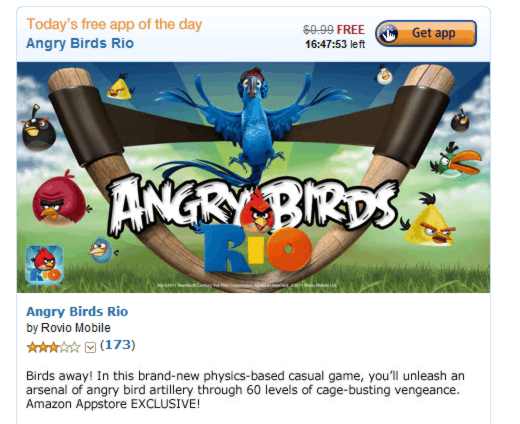| Amazon Appstore launches with controversy |
| Written by Ian Elliot | |||
| Tuesday, 22 March 2011 | |||
|
The Amazon Appstore is here and it's already getting sued so it must be important. We take a look at what it all means for the developer. The Amazon Appstore for Android sort of leaked out over the past few days. First it was there then it was gone, then it was there again. Rumours have it that it crashed soon after it was switched on early this morning but now it seems to be switched on permanently and Amazon has finally announced that it is launched. You can also download a free and exclusive copy of Angry Birds Rio if you haven't already got tired of last week's hit game. Amazon will give it away free today and another paid for app will be given away free each day.
A twist in the story is that as the Appstore launched Amazon was hit with a law suit from Apple for the "improper" use of the term "app store". Apple has a trademark on App Store something which pleases no one but Apple - Microsoft has challenged it already and Amazon seeks to avoid it by running the two words together but is Appstore really any different to App Store? The real issue is the whole idea of patenting something as trivial and so generally used as "App Store". What is so amazing about Amazon Appstore? Isn't it just another app store to make things more complicated? Well yes and no. It might be the next step in the commoditization of apps. The Amazon Appstore brings the idea of selling apps to one of the world's top seller of just about everything. This places the app alongside books, food, clothing and... well you name it. Amazon also has a unique feature, for the moment, in the form of "test drive". This lets customers run an app in an Android simulator within the web page so that they can try it out without even downloading it to their phone or tablet. At launch the site was estimated to have just short of 4000 apps. The way that apps are installed is also slightly different. You can buy an app via the web on your desktop machine. You supply the number of your mobile or an email address. Amazon then sends you a message which you need to open on your phone to download and install the Appstore. Once you have the Appstore installed on a phone you can browse and download directly from the phone or tablet. At the moment when you actually order something a video explaining how to download and install pops up. It all works perfectly well, as long as you have one click purchasing turned on. The only problem is that it only works in the US at the moment which is not good for a developer looking for a world market. What is important from the developer's point of view is that Amazon pays the standard commission of 70% but they set the discount that the app is sold at. What you actually get is either 20% of the price you set or 70% of the actual sales price, whichever is greater. This sounds bad because if Amazon wants to it can discount your app to next to nothing. Is this good? If you are worried about the absolute value of your app then no. If you are interested in maximising your income it probably is. Amazon has lots of experience in working out price versus volume and attempts to maximise total profit. So as long as things work out you should end up with more cash at the end of the day. Of course theory isn't practice. There is also the small matter of the number of people who have an Amazon account who can now buy your app with a single click and without having to supply a payment method all over again. Overall it is difficult to see Amazon's move into selling apps as being something bad or worrying. More Information
|
|||
| Last Updated ( Tuesday, 02 August 2011 ) |

